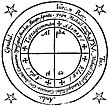
| Part of a series on |
| Thelema |
|---|
 |
| The Rights of Man |
| Part of a series on |
| Magic |
|---|
 |
Thelema (/θəˈliːmə/) is a Western esoteric and occult social or spiritual philosophy[1] and a new religious movement founded in the early 1900s by Aleister Crowley (1875–1947), an English writer, mystic, occultist, and ceremonial magician.[2] Central to Thelema is the concept of discovering and following one's True Will, a unique purpose that transcends ordinary desires. Crowley's system begins with The Book of the Law, a text he maintained was dictated to him by a non-corporeal entity named Aiwass. This work outlines key principles, including the axiom "Do what thou wilt shall be the whole of the Law," emphasizing personal freedom and the pursuit of one's true path, guided by love.
The Thelemic cosmology features deities inspired by ancient Egyptian religion. The highest deity is Nuit, the night sky symbolized as a naked woman covered in stars, representing the ultimate source of possibilities. Hadit, the infinitely small point, symbolizes manifestation and motion. Ra-Hoor-Khuit, a form of Horus, represents the Sun and active energies of Thelemic magick. Crowley believed that discovering and following one's True Will is the path to self-realization and personal fulfillment, often referred to as the Great Work.
Magick is a central practice in Thelema, involving various physical, mental, and spiritual exercises aimed at uncovering one's True Will and enacting change in alignment with it. Practices such as rituals, yoga, and meditation are used to explore consciousness and achieve self-mastery. The Gnostic Mass, a central ritual in Thelema, mirrors traditional religious services but conveys Thelemic principles. Thelemites also observe specific holy days, such as the Equinoxes and the Feast of the Three Days of the Writing of the Book of the Law, commemorating the writing of Thelema's foundational text.
Post-Crowley figures like Jack Parsons, Kenneth Grant, James Lees, and Nema Andahadna have further developed Thelema, introducing new ideas, practices, and interpretations. Parsons conducted the Babalon Working to invoke the goddess Babalon, while Grant synthesized various traditions into his Typhonian Order. Lees created the English Qaballa, and Nema Andahadna developed Maat Magick.
- ^ Crowley (1996), pp. 61–62.
- ^ Kaczynski (2010).